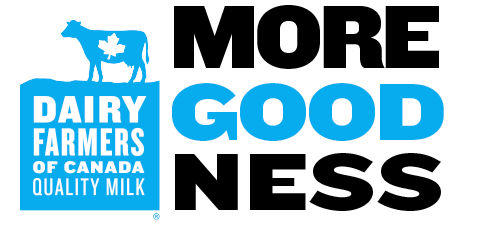Become a protein pro
Protein plays a number of key roles in supporting your health. It helps to:
- promote children’s optimal growth and development
- maintain healthy muscles and bones in adults;
- facilitate muscle recovery after a workout;
- repair body tissues after an injury;
- support a healthy immune system.
It's important to eat some protein with every meal in order to meet your body's needs. Since our bodies aren't designed to store excess protein, we need a regular supply.
Protein is found naturally in a number of foods: meat, poultry, fish and seafood, milk products, eggs, legumes, nuts and seeds. Protein foods, along with vegetables, fruit and whole grains, form the foundation for healthy eating that Canada’s Food Guide recommends we consume on a regular basis.
Protein from animal sources: “complete” protein
Protein found in milk, yogurt and cheese is considered a “complete protein.” All animal-based foods such as meat, fish, milk, yogurt and cheese contain complete protein. “Complete” protein provides enough of all nine essential amino acids in the right proportions that your body cannot produce. On the other hand, plant-based protein, found in most legumes, nuts and grains, for example, are deemed “incomplete.”
Variety promotes health
A diet that includes a variety of protein foods matters, because it provides us with the various essential nutrients we need for our overall health. For example, fatty fish, such as salmon and trout, contain valuable omega-3; red meat is especially rich in iron and zinc that is easy for the body to absorb; milk products are an important and reliable source of calcium and other key nutrients essential for bone health; legumes and nuts are fabulous sources of fibre in addition to other nutrients. That’s why it’s important to include a wide variety of protein foods in your everyday diet.
Did you know that the majority of Canadians do not consume enough calcium? Including milk products, such as milk, yogurt, and cheese, in your daily diet is an easy way to make sure you’re getting your recommended dose of calcium. Learn more about calcium.
Protein: An ally for active lives
Eating enough protein is important to help build and maintain healthy muscles. Protein helps repair muscles after intense physical activity and stimulates muscle development after training. Looking for post-workout protein ideas? Try our green mango tango smoothie.
Protein and your appetite
Protein plays a key role in promoting satiety, the feeling of fullness you get after you eat. Not eating enough protein, may leave you feeling hungry, which could lead you to snack more (often on less nutritious foods). Another good reason to eat enough protein with your meals and snacks.
Protein…all day long
Does your breakfast keep you full until lunch? Do your energy levels tend to “crash” in the middle of the afternoon? Do your snacks contain enough protein? Here are a few satisfying recipe ideas that are sure to tickle your taste buds:
Breakfast
- Start the day off right with a delicious oven-cooked omelette the whole family will love: Roasted broccoli mushroom mozza frittata.
- Enjoy a colourful smoothie bowl before heading to work: Blueberry smoothie bowl.
Lunch
- Fuel up on energy at lunch with an Italian-inspired sandwich: Super easy chicken parm.
- Always round out your salads with a source of protein, as in this delicious Pasta and edamame salad.
Snack
- Pair your fruit with a yogurt dip the whole family will enjoy: Fruidelicious and dip.
- Make yourself a refreshing afternoon snack, like this Raspberry-ricotta smoothie.









